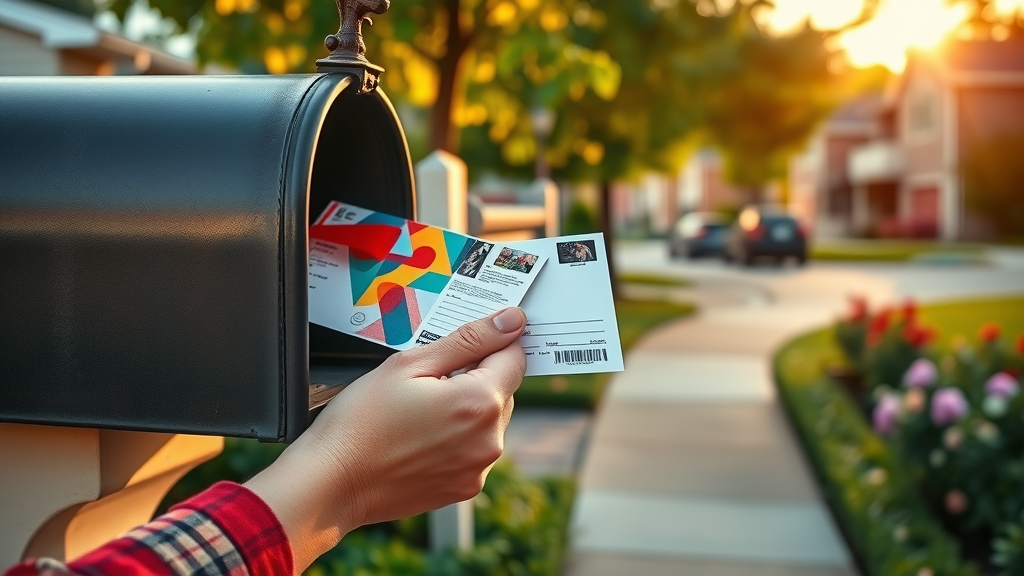Did you know: According to the SBA, over 20% of small businesses fail within their first year—often because their marketing strategies simply don’t connect with their target audience. But what if effective small business marketing tips are the game changer separating successful businesses from those that struggle to survive? In this guide, you’ll uncover the actionable strategies, insider secrets, and expert advice you need to fuel your brand’s growth—no matter your budget or industry.
Unlocking Growth: Why Small Business Marketing Tips Are Your Greatest Asset
The small business landscape is fiercely competitive. To rise above the noise, leveraging the right small business marketing tips isn’t just an option—it's essential for survival and long-term growth. By focusing your marketing efforts, you can rapidly expand your customer base and establish a robust business profile that positions your company as an authority in your industry.
Effective marketing strategies help you attract more potential customers, convert them into loyal buyers, and differentiate your product or service from countless competitors in the current business market . Whether you’re just launching or looking to reinvent your brand, understanding the foundations of business marketing can set the stage for exponential growth. Throughout this article, you’ll discover practical approaches, from basic tips for small businesses to advanced tactics adopted by industry frontrunners.

Surprising Statistics: The Reality of Small Businesses in Today’s Market
"According to the SBA, over 20% of small businesses fail within the first year, often due to poor marketing. Effective small business marketing tips can be a lifeline."
Numbers don’t lie: More than half of small business owners recognize marketing as their toughest top-three challenge, and nearly one-third feel uncertain about which marketing tools to use. Adopting a focused, dynamic marketing strategy can tip the scales in your favor, especially if you know where to begin and what metrics matter most.
Essential Small Business Marketing Tips to Build Your Brand
For small businesses, success starts with deliberate action. The marketing tips you embrace today determine how well your brand stands out in a bustling business market . Brands with a clear sense of direction, strong identities, and thoughtful outreach—via both online and offline marketing tools —consistently outperform those who “wing it” or try to appeal to everyone. By building awareness through smart, systematic small business marketing efforts, any company can forge deeper connections with their desired target market .

Develop a Solid Marketing Strategy for Small Businesses
- Define your target audience: Understand your ideal customer’s demographics, needs, and preferences to tailor your message and products.
- Set clear business marketing goals: Establish measurable objectives, such as website traffic growth, lead generation, or increased sales.
- Analyze your business market competition: Study competitors’ strengths and weaknesses to identify your unique value proposition.
- Utilize cost-effective marketing tools: Choose solutions like social media, email, and design platforms that deliver high ROI for small marketing budgets.
Laying this foundation gives your marketing plan the structure it needs to adapt as your business grows. Each element—from competitive analysis to goal-setting—is crucial for crafting messaging that resonates and delivers.
How to Create a Winning Small Business Marketing Plan
- Assess your business profile: Review your brand’s image, messaging, and digital presence for consistency and appeal.
- Map out a content and email campaign calendar: Plan your blog posts, social media activity, and email marketing efforts in advance for maximum impact.
- Integrate social media strategies: Use platforms your audience loves and maintain an active, engaging presence.
- Allocate resources for mail marketing: Reserve a portion of your budget for creative mailers that keep your brand top-of-mind locally.
By continuously refining these plans and adapting to market trends, you keep your company agile and customer-focused in the evolving business market .
Mastering Marketing Strategies for Small Businesses
To get real results, your small business marketing must go beyond the basics. Mastering digital channels, leveraging personal relationships, and utilizing both modern and traditional marketing tactics enable your brand to shine—regardless of size or budget. Let's break down the top strategies every small business should master to compete with industry heavyweights.

Utilize Social Media: Boosting Visibility and Engagement
- Choose the right platforms for your target audience: Not all social channels are created equal. Focus your marketing efforts on platforms where your customers are most active.
- Content creation and curation: Share a mix of original content, curated blog posts, and industry news to keep your feed informative and entertaining.
- Leverage user-generated content and customer testimonials: Sharing real stories from actual clients builds trust and community around your brand.
Social media isn’t just about posting photos or promotions—it’s an indispensable marketing tool that helps you build credibility, foster community, and establish your voice in a crowded business market . Interactivity, creativity, and genuine engagement will win you more followers and, ultimately, more business.
The Power of Email Marketing for Small Business Growth
- Build a segmented email list: Organize contacts by interest, purchase history, or location for targeted email campaign success.
- Craft compelling email campaigns: Use storytelling, offers, and value-driven tips tailored to your segmented lists.
- Monitor and optimize open and click rates: Analyze which content resonates most to perfect future campaigns and maximize ROI.
Email marketing remains one of the highest return-on-investment marketing strategies for small businesses, making it an essential part of your overall marketing plan . From nurturing leads to turning past buyers into repeat customers, strategic campaigns yield measurable results.
Watch: Top 5 Email Marketing Tools for Small Businesses
Maximize Local Impact with Business Cards and Offline Tactics
- Networking events and community fairs: Attend local gatherings to meet potential customers face-to-face and build invaluable connections.
- Unique designs for memorable business cards: A well-designed business card leaves a strong, lasting impression and keeps your brand top of mind.
- Integrate QR codes with your small business marketing campaigns: Tie your offline presence to your digital business profile and track offline-to-online conversions.

In a digital-first world, don’t underestimate the personal power of face-to-face connections and tangible marketing pieces. Local events, business cards with creative flair, and smart integrations (like QR codes) can elevate your presence and complement your online marketing strategies .
Digital Marketing Tools Every Small Business Needs
Navigating the ever-changing digital landscape can be daunting, especially when marketing budgets are tight. The right marketing tools streamline tasks, automate repetitive work, and maximize your reach—even with minimal resources. Leveraging proven apps and platforms tailored to small businesses enables you to compete with bigger brands without hefty costs.

Choosing the Right Marketing Tools: From Social Media Management to SEO
| Tool | Best For | Cost Level |
|---|---|---|
| Hootsuite | Social Media Management | Medium |
| Mailchimp | Email Campaigns | Low |
| Canva | Design & Branding | Low |
| Google Analytics | Market Research and Traffic | Free |
Matching your business needs with the right marketing tool can drastically improve productivity, efficiency, and results. Compare features and pricing to be sure you’re getting the best value for your specific objectives.
Google Business Profile: Your Small Business’s Digital Storefront
- Claim and optimize your business profile: Fill out every detail, choosing quality photos and accurate business information for search engine visibility.
- Encourage and respond to customer reviews: Engaging with feedback builds credibility with potential customers and improves local rankings.
- Share updates and promotions to attract potential customers: Use your profile as a mini-website for timely offers, events, and business news.
"A strong online business profile is often the first impression a potential customer has of your business."
Watch: How to Optimize Your Google Business Profile for Maximum Exposure
Building a Target Audience: Market Research and Personalization
Successful small business marketing revolves around understanding who your customers are and how best to reach them. Market research is more than a box to check—it's the data-driven foundation for building customer loyalty, driving conversions, and outpacing competitors. When combined with smart personalization, these tactics give you a significant edge in any business market .

Market Research: Understanding Your Target Market for Effective Small Business Marketing
- Analyze competitors in your business market: Research how similar companies succeed or stumble, and refine your strategies accordingly.
- Identify gaps and opportunities: Spot the needs and preferences your rivals overlook for unique positioning.
- Use surveys and polls to shape your marketing plan: Gather direct feedback from your target audience to guide content and campaigns.
Conducting regular market research sharpens your messaging and priorities, ensuring your marketing efforts are never wasted on the wrong crowd.
Personalizing Marketing Strategies for Your Potential Customers
- Segment your email list: Group subscribers by needs or behavior for tailored email marketing outreach.
- Leverage customer data to refine your marketing strategy: Track which content drives engagement and sales, then double down on what works.
- Test and tweak marketing tactics for optimal results: Experiment with messaging, timing, and offers until you find the highest-performing mix.
Personalization isn’t just a buzzword—it’s the backbone of impactful small business marketing tips . When customers feel understood, they reward you with loyalty and referrals.
Watch: Expert Interview: How Market Research Shapes Business Success
Mail Marketing: A Classic Yet Powerful Small Business Tool
While digital dominates, mail marketing still delivers strong and surprising results for small businesses . A creative, well-targeted mail campaign can cut through the digital fog and directly connect with your potential customers locally. Often overlooked, but incredibly effective when paired with other marketing strategies , direct mail generates strong engagement and lasting impressions.
Why Direct Mail Still Works for Small Businesses
- Reaches local potential customer base: Physical mail delivers a tactile, memorable connection with people in your own backyard.
- Less cluttered than digital inboxes: Your postcard or brochure gets noticed faster, often with less competition than crowded email inboxes.
- Pairs well with digital marketing strategies: Integrating mailers with online promotions multiplies campaign effectiveness.

Top Mail Marketing Tactics for Small Business Growth
- Personalized postcards: Include the recipient’s name, past purchases, or local touches for higher response rates.
- Exclusive offers: Give first-access deals or coupons to entice immediate action from your potential customer .
- Follow-up mailers for customer loyalty: Send thank-you notes, anniversaries, or reminders to keep your brand top-of-mind.
Smart mail marketing isn’t about “spammy” flyers—it’s about targeted, meaningful touchpoints that complement online efforts and reinforce connections with existing and future buyers.
Crafting a Multi-Channel Marketing Plan for Small Businesses
Relying on one promotional avenue leaves small businesses vulnerable. A powerful, multi-channel marketing plan uses both digital and offline tactics, ensuring you reach customers wherever they are. Integrating these efforts gives your business profile cohesion and maximizes your brand’s visibility.
Integrating Digital and Offline Marketing Tactics
- Cross-promote online and offline offers: Announce in-store specials online, and direct in-person customers to your website or social media pages.
- Track and measure effectiveness across channels: Use promo codes, QR codes, and online analytics to link offline actions to digital outcomes.
- Align your marketing strategy with your business goals: Whether launching a new product or increasing local conversions, keep your objectives top priority.

Blending various channels—social media, direct mail, events, and more—amplifies your marketing effort by creating multiple touchpoints that guide potential customers through the buying journey.
Ensuring Consistent Branding and Messaging
- Establish brand guidelines: Develop a style guide for colors, fonts, tone, and messaging to maintain a recognizable presence in all marketing tools .
- Maintain consistency across marketing tools: Use the same logo, voice, and key messages on your website, business cards, mailers, and social channels.
- Monitor customer feedback and adapt messaging: Keep an ear to the ground—adjust if your audience’s expectations or pain points change.
Consistent branding instills confidence and familiarity. Your target audience should immediately recognize your style and trust your voice, no matter where or how they interact with your brand.
Key Small Business Marketing Tips for Retaining Customers
Winning new customers is only half the battle; keeping them is where most businesses struggle. Repeat business and referrals fuel sustainable growth, and effective retention strategies make your small business stand out in the long run. Here’s how to transform one-time shoppers into lifelong patrons.

Customer Loyalty Programs as a Marketing Tool
- Exclusive perks for repeat buyers: Reward loyal customers with discounts, early access, or VIP events.
- Referral rewards: Encourage existing customers to introduce new faces by offering small incentives or bonuses.
- Birthday and milestone offers: Celebrate special occasions to create memorable bonds with your customer base.
A smart loyalty program is a low-cost marketing tactic that inspires continued relationships while transforming customers into brand ambassadors.
Follow-Up Strategies to Nurture Relationships with Potential Customers
- Personal thank you notes: A handwritten message leaves a lasting impression.
- Feedback surveys: Show you care about satisfaction and use input to fuel improvements.
- Regular value-driven email marketing: Share tips, product updates, and stories that keep your audience engaged between purchases.
Watch: Case Study: Building Customer Loyalty for a Local Small Business
Tracking Success: Measuring Your Small Business Marketing Efforts
To maximize your return, you must measure what matters. Tracking key metrics reveals which small business marketing strategies produce results, and which need tweaking. Armed with real data, you can outsmart competitors and confidently invest in the approaches that work.

Key Metrics for Small Business Marketing campaigns
- Organic and paid traffic growth: Track website visitors from search engine results, ads, and referrals.
- Conversion and click-through rates: Measure how well your site turns visitors into leads or buyers.
- Customer acquisition cost: Calculate how much you spend to acquire each new customer.
- ROI on specific marketing tactics: Compare which marketing tools yield the best return for your investment.
By regularly assessing these KPIs, you ensure your marketing efforts remain efficient, scalable, and directly aligned with your business goals.
Optimizing Your Small Business Marketing Strategies Based on Analytics
- Interpret analytical data: Look for patterns, such as which blog posts or campaigns generate the most revenue or leads.
- Run split tests for different marketing tools: Test subject lines, calls-to-action, and landing pages to increase performance.
- Adapt your marketing plan based on real-time data: Don’t be afraid to pivot if analytics indicate declining engagement or ROI.
The best marketing strategies are never static. Use what you learn to continually refine your approach and stay ahead of the curve.
People Also Ask: Common Questions About Small Business Marketing Tips
What is the 3-3-3 rule in marketing?
The 3-3-3 rule in marketing is a simple but powerful framework: Reach out to three potential customers in three different ways, three times. This approach maximizes engagement by using diverse marketing tactics such as email, phone calls, and social media, ensuring your message isn’t lost and making each marketing effort count.
What is the best marketing strategy for small businesses?
The best marketing strategy for small businesses combines targeted social media campaigns, local search engine optimization, highly-personalized email marketing , and consistent branding across all touchpoints. Leveraging these tactics together creates the strongest possible impact and builds lasting customer relationships.
What are the 5 P's of marketing?
The 5 P’s of marketing—Product, Price, Place, Promotion, and People—are the building blocks of any effective marketing plan . Define your offerings, determine your pricing, choose the right sales channels, promote smartly, and always keep people (your staff and customers) at the heart of every decision.
What are the three C's in marketing?
The three C’s—Company, Customer, and Competitor—serve as the cornerstones of business marketing . Analyze your own strengths, deeply understand your target market , and keep a close eye on business market competition to inform every marketing strategy you implement.
FAQ: Your Top Small Business Marketing Tips Questions Answered
- How often should I update my marketing strategy for my small business? Regularly updating your marketing strategy is crucial. Aim to review it at least quarterly, or whenever you launch a new product, enter a new market, or notice shifts in business market trends.
- What are affordable marketing tools for small businesses on a tight budget? Cost-effective marketing tools include Mailchimp for email campaigns , Canva for design, Hootsuite for social media scheduling, and Google Analytics for tracking marketing efforts .
- How do I know which marketing channel is working best? Use analytics to monitor KPIs, such as conversions, traffic, and engagement. Comparing the ROI across marketing channels reveals where to focus your resources.
- What are effective ways to build a business profile online? Claim and optimize your Google Business Profile, regularly update your website and social presence, share engaging blog posts , and encourage customer reviews to solidify your digital credibility.
- Is traditional marketing still effective for small businesses? Absolutely. Tactics like mail marketing , well-designed business cards , and local sponsorships build credibility and supplement your digital marketing plan —especially within your local customer base .
Expert Tips for Small Business Marketing Success
- Embrace experimentation—test and learn from each campaign: Don’t be afraid to try new tactics and measure their results.
- Never overlook local partnerships and collaborations: Working with local businesses or organizations expands your reach and credibility organically.
- Stay updated on the latest trends in small business marketing strategies: Subscribe to industry blogs, attend webinars, and be proactive about learning to keep your business ahead.

Feeling Overwhelmed by Digital Marketing? Let’s Build Your Small Business Marketing Plan Together
Feeling overwhelmed by digital marketing? We’ll map out a strategy tailored to your goals. Call (513)463-7269
Conclusion: Take action now—choose one marketing tactic from this guide and put it into play for your small business this week. Your growth starts with a single step.
To further enhance your understanding of effective small business marketing strategies, consider exploring the following resources:
- “10 Small Business Marketing Strategies That Actually Work” ( entrepreneur.com )
This article provides practical strategies tailored for small businesses, including leveraging influencers, connecting with local businesses, and offering incentives to attract and retain customers.
- “10 Marketing Tips for Small Business Owners to Develop a Successful Marketing Strategy” ( seangarner.co )
This resource offers insights into focusing on local SEO, investing in paid advertising campaigns, and nurturing leads with email automation to build a robust marketing strategy.
By delving into these articles, you’ll gain actionable tips and strategies to effectively market your small business and drive growth.
 Add Row
Add Row  Add
Add 




Write A Comment